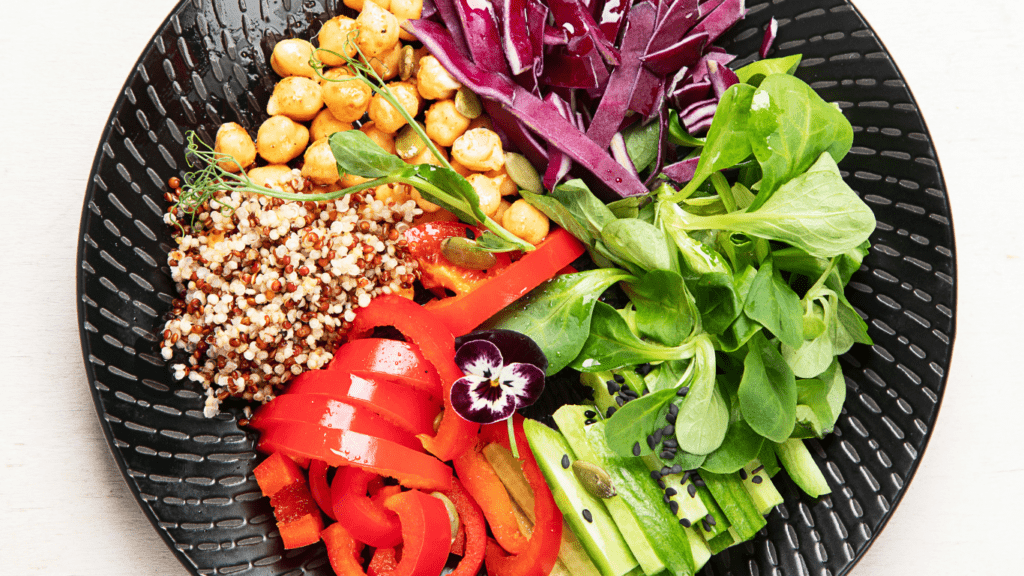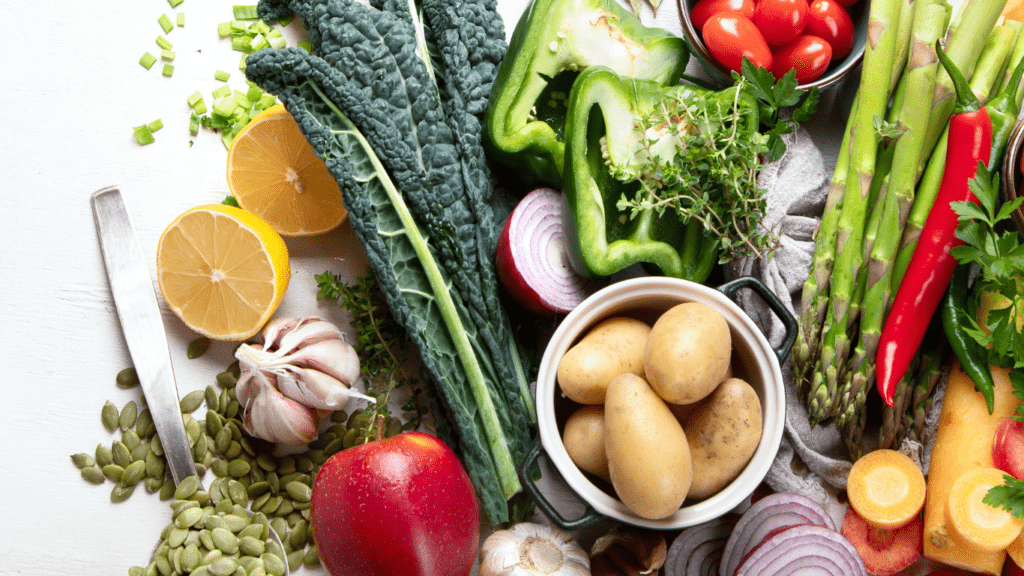Understanding Plant-Based Diets for Athletes
Plant-based diets, especially vegan diets, have become popular among athletes due to their numerous benefits. Let’s explore what a plant-based diet entails and compare vegan and vegetarian diets.
What Is a Plant-Based Diet?
A plant-based diet focuses on foods derived from plants including vegetables, fruits, nuts, seeds, oils, legumes, and whole grains. Athletes following this diet exclude or minimize animal products.
This diet provides essential nutrients like fiber, vitamins, and antioxidants beneficial for athletic performance. Incorporating a variety of plant foods ensures a well-rounded intake of proteins, fats, and carbohydrates essential for training and recovery.
Comparing Vegan and Vegetarian Diets
Both vegan and vegetarian diets emphasize plant-based foods, yet they differ in their inclusion of animal products.
- Vegan Diet: Excludes all animal products, including meat, dairy, eggs, and honey. Vegans rely solely on plant-based sources for their nutritional needs.
This can benefit athletes by reducing inflammation and promoting faster recovery times due to the high intake of antioxidants and phytonutrients found in plants.
- Vegetarian Diet: Allows some animal products like dairy and eggs but excludes meat and fish. While vegetarians enjoy many benefits of a plant-based diet, they may still consume high-fat animal products, which can impact performance.
Understanding these differences helps athletes choose the best diet for their needs, ensuring they obtain all necessary nutrients for optimal performance and recovery.
Benefits of a Vegan Diet for Athletes
A vegan diet can offer numerous benefits for athletes. It focuses on nutrient-rich plant foods that can positively impact various aspects of athletic performance.
Improved Cardiovascular Health
A vegan diet can significantly improve cardiovascular health. Plant-based foods are generally lower in saturated fats and cholesterol, contributing to better heart health.
Studies have shown that athletes on vegan diets often have lower blood pressure and LDL cholesterol levels. Legumes, whole grains, and fruits provide essential nutrients like:
- fiber
- magnesium
- potassium
Which support heart function.
A healthier cardiovascular system allows athletes to endure longer training sessions without the risk of heart-related issues.
Sustainable Energy Levels
Sustainable energy levels are crucial for athletes. Plant-based diets, rich in complex carbohydrates from sources like quinoa, brown rice, and oats, provide a steady release of energy.
This slow digestion prevents energy spikes and crashes, ensuring consistent performance throughout the day. Athletes consuming vegan diets also benefit from higher intake of vitamins, such as B vitamins, which play a vital role in energy production.
Ensuring a balanced diet that includes various plant-based proteins, healthy fats, and carbs helps maintain optimal energy levels.
Enhanced Recovery Times
Enhanced recovery times are another key benefit of a vegan diet. Plant-based foods are packed with antioxidants and phytonutrients that help reduce inflammation and oxidative stress.
Vegetables, fruits, nuts, and seeds provide essential nutrients like vitamin C, vitamin E, and omega-3 fatty acids, aiding muscle repair and recovery.
Reduced inflammation minimizes the risk of overuse injuries and accelerates healing processes, allowing athletes to return to their training routines faster.
Proper intake of plant-based proteins, such as:
- tofu
- tempeh
- lentils
Ensures muscle rebuilding and overall recovery efficiency.
Challenges of Vegan Diets for Runners
Vegan diets offer many benefits, but they can present challenges for runners. It’s essential to address these to maintain optimal performance.
Meeting Protein Requirements
Ensuring sufficient protein intake is crucial for muscle repair and growth. While plant-based sources like legumes, nuts, seeds, and soy products are rich in protein, they can be less concentrated in amino acids.
I find combining different protein sources, such as lentils and quinoa, achieves a complete amino acid profile. A study in The American Journal of Clinical Nutrition states that consuming varied plant proteins throughout the day can meet athletes’ protein needs.
Ensuring Adequate Vitamin and Mineral Intake
Runners on vegan diets may face challenges in getting enough vitamins and minerals. Critical nutrients like vitamin B12, iron, calcium, and omega-3 fatty acids are predominantly found in animal products.
I rely on fortified foods and supplements to bridge this gap. Incorporating leafy greens for calcium, fortified plant milk for vitamin B12, and flaxseeds or chia seeds for omega-3s helps ensure balanced nutrition.
Research highlights in the journal Nutrients indicate that with mindful planning, vegans can obtain necessary micronutrients to support athletic performance.
Success Stories: Athletes on Plant-Based Diets

Professional athletes are increasingly adopting plant-based diets. Their experiences offer valuable insights into how veganism impacts performance and endurance. Below, I’ll share some compelling examples.
Case Studies from Professional Runners
Scott Jurek
Scott Jurek, an ultramarathoner, has been vegan since 1999. He achieved notable victories including multiple wins at the Western States Endurance Run (seven times) and the Badwater Ultramarathon. He credits his plant-based diet with quick recovery times and sustained energy levels during long races.
Fiona Oakes
Fiona Oakes, a marathoner with four marathon world records, switched to a vegan diet at age six. She believes her diet helps maintain her stamina and reduce inflammation, which contributes to her record-breaking performance despite losing a kneecap to illness at age 17.
Rich Roll
Rich Roll, a former collegiate swimmer turned ultradistance triathlete, became vegan in his 40s. He completed the Ultraman World Championships and credited his diet with enhancing endurance.
Roll’s transformation from an unfit midlifer to an elite athlete strengthens the case for plant-based nutrition.
Impact on Performance and Endurance
Athletes like Jurek, Oakes, and Roll report improved performance. They experienced faster recovery and increased stamina, allowing for more intensive training sessions.
The absence of inflammatory animal products enabled quicker muscle repair, and the high intake of antioxidants and phytonutrients supported overall health.
Moreover, these athletes observed enhanced cardiovascular health from lower cholesterol levels, contributing to better endurance. Complex carbohydrates in whole grains and legumes provided sustainable energy, crucial for long-distance events.
Summarizing these stories, a disciplined plant-based diet appears to complement rigorous athletic demands. Various examples show it’s possible to achieve peak performance while adhering to vegan principles.
Practical Tips for Adopting a Vegan Diet
Adopting a vegan diet offers numerous health benefits for athletes. Proper planning ensures balanced nutrition and sustained energy levels.
Meal Planning and Preparation
Effective meal planning is crucial. Create weekly meal plans incorporating diverse foods to ensure nutrient intake. Include:
- vegetables
- fruits
- whole grains
- legumes
Batch cook meals to save time. Prepare large portions and store them in portions for easy access. For example, cook quinoa, lentils, and roasted vegetables in bulk.
Invest in quality kitchen tools. High-speed blenders and food processors help create smoothies and sauces rich in nutrients. Stock up on spices and herbs for flavor and health benefits, like turmeric for its anti-inflammatory properties.
Recommended Nutritional Supplements
Even with a balanced vegan diet, supplements can be beneficial. Vitamin B12 is essential since it’s not available in plant foods. Take B12 supplements or consume fortified products.
Ensure adequate omega-3 intake. Sources like flaxseeds, chia seeds, and algae-based supplements provide plant-based omega-3.
Consider taking iron supplements if you have low iron levels. Plant-based iron is less readily absorbed, so consult with a healthcare professional.
Incorporate vitamin D supplements, especially if you have limited sun exposure. This vitamin helps in bone health and overall performance.
By following these practical tips, athletes can successfully adopt a vegan diet while maintaining peak performance.



